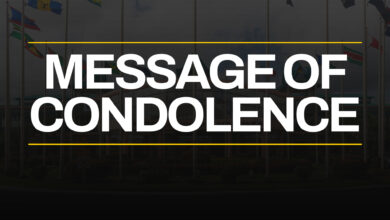Under the theme – Champions for Change – a Conference, hosted by the Caribbean Community (CARICOM) in partnership with the Caribbean-led Pan Caribbean Partnership Against HIV/AIDS (PANCAP) and the United Kingdom Department For International Development (DFID), was held in St. Kitts and Nevis on 22-24 November 2004. The purpose of the Meeting was to share International Best Practices on reducing stigma and discrimination against people living with HIV/AIDS (PLWHA). Its overall objective was to accelerate the process of reducing HIV/AIDS-related stigma and discrimination in the Caribbean, and to identify and empower persons who would be Champions for Change in the fight to reduce HIV/AIDS-related stigma and discrimination; considered to be a major cause of the spread of the epidemic.
The CARICOM team was lead by the Hon Dr. Denzil Douglas, Prime Minister of St. Kitts and Nevis and Head of Government with responsibility for health, and the Hon. Gareth Thomas, Parliamentary Under-Secretary of State, United Kingdom (UK).
Also in attendance were more than 15 CARICOM Ministers, representatives from Associate Member States, the International Community including the European Union (EU), India, Mexico, Brazil, the United Kingdom (UK), the United States of America (USA), the Regional private sector, the media, faith-based organisations, labour, the Caribbean Regional Network of PLWHA, donor agencies, United Nations Agencies, Regional Universities and Parliaments, international experts in HIV/AIDS and Youth Organisations, participated in the deliberations of the Meeting. Caribbean Cultural Icons including Ambassador Courtney Walsh, former West Indies Cricket Captain and Pace Bowler and the Mighty Gabby, renowned Barbadian Calypsonian, also made their impact on the Meeting.
The High Level Conference was preceded by a Technical Meeting of regional and international experts to present and discuss Best Practice Models and Approaches in reducing stigma and discrimination in the Region. This Meeting was chaired by Dr. Peter Figueroa, Coordinator, National AIDS Programme, Jamaica. The Technical Meeting considered working papers on a range of issues including law, ethics and human rights, Policies used with regard to stigma and discrimination as well as Prevention and Control.
The objectives of the Technical Meeting, were sharing best practice models; arriving at consensus on the factors underlying stigma and discrimination; initiating a framework for a Plan of Action for regional leaders; and initiating a process for the Development of a Toolkit for the Reduction of Stigma and Discrimination.
The Meeting considered four key technical presentations which focused on moving policy to action; Caribbean context of law, ethics and human rights; socio-cultural practices that perpetuate stigma and discrimination; and leadership in reduction of stigma and discrimination.
Three Working Groups discussed and analysed issues relating to definitions of and conceptual framework for stigma and discrimination. Specific outputs of the Working Groups included:
A Framework Plan of Action Against Stigma and Discrimination. The target audience for this framework included political leaders and decision leaders; opinion shapers – private sector, community leaders at various levels, civic leaders and faith-based leaders; regional leaders such as CARICOM and the PANCAP. This Plan of Action also addressed issues such as building ownership, the supportive legal and policy environment, advocacy, research, and monitoring;
A draft outline of an Anti-Stigma Regional Toolkit. This Toolkit addressed a range of issues including resources to support champions; 'mentoring'/ongoing support for champions; sustained communication and information exchange and capacity-building to catalyze action at other levels in the community; and
An outline of the Role of the Media in Anti-Stigma Advocacy in Action. Issues addressed included communication strategy; the media and the socialisation process; messages and training.
The Opening Ceremony of the High Level Conference was chaired by Dr. Edward Greene, Assistant Secretary-General, Human and Social Development, CARICOM Secretariat. Welcome Remarks were delivered by Dr. Douglas Slater, Minister of Health and Environment, St. Vincent and the Grenadines. Remarks were also delivered by Dr. Peter Piot, Executive Director, UNAIDS, (by video); Ms. Yolanda Simon, Regional Coordinator CRN+ and the Hon. Gareth Thomas, Parliamentary Under-Secretary of State, United Kingdom. A song entitled I'm Really Going to Need a Friend was specially composed and sung by Ms. Beverley Reynolds, Deputy Programme Manager, Health Sector Development, CARICOM Secretariat, together with a specially commissioned jingle Love is the Message, was endorsed as part of the Official Outcomes of the Conference and would be used to promote Champions for Change Reducing HIV/AIDS Stigma and Discrimination.
The keynote address was delivered by the Hon. Dr. Denzil Douglas. The Prime Minister noted that the Meeting was “a watershed event in that it has assembled in one place an unprecedented number of political leaders and policy-makers at the highest decision-making level from within and without the Region to address an issue that is at the core of prevention and cure initiatives with respect to HIV/AIDS”. He also analysed the critical barriers to be dismantled in the fight against stigma and discrimination and articulated elements of charting the way forward on this issue.
The initial Plenary Session deliberated on salient issues arising from a Keynote Address on “Addressing Stigma and Discrimination in the Region” by Sir George Alleyne, Director, Caribbean Commission on Health and Development; and the UN Special Envoy to the Caribbean on HIV/AIDS. Sir George explored approaches to the reduction of stigma and discrimination including behaviour change through education and finding measures to protect persons from Stigma and Discrimination as it currently exists. He called for an end to “otherness” in health.
Subsequent Plenary Sessions received and deliberated on key presentations on “Human Rights and Legislation” and “Leadership Confronting HIV/AIDS Stigma and Discrimination in the Caribbean”. The latter presentation by H.E. Mr. Edwin Carrington, Secretary-General, Caribbean Community, called for the following three significant outcomes of the Conference:
that the Region learn from the lessons of successful ventures, that no single approach would work and that it was possible for all stakeholders, including Religious Organisations to pursue their approaches on parallel tracks rather than as opponents;
that the role of the PANCAP be endorsed as a conduit for ensuring the continuing move towards an integrated inter-sectoral model for addressing HIV; and
the development of concrete priorities for implementation with timelines.
The Conference also convened interactive and informal break-out sessions on stigma and discrimination reduction. These sessions comprised a set of facilitator-led participatory exercises, games, discussion and real-life case studies for raising personal awareness and understanding of stigma – what it means, why it is an important issue, its root causes, advocacy, commitment-building, and strategies to challenge stigma.
The Conference also analysed the Keynote presentation on “The Role of the Media in HIV/AIDS Stigma and Reduction: Advocacy and Action”. This was led by Mr. Roy Head, Director, BBC World Service Trust, UK, which drew on lessons from Brazil, India, Spain, South Africa and the UK.
The Faith-based Organisations circulated a Paper articulating several options for maintaining beliefs and values while working to reduce stigma and discrimination through compassion, care and the provision of services to PLWHAs.
Two of the major outcomes of the Conference included: “A Champions for Change Declaration of Commitment to Reduce Stigma and Discrimination Against PLWHAs”. This Declaration affirms that HIV/AIDS is preventable and that transmission of infection could be prevented through behavioural change. It also articulates elements of an appropriate legislative, policy and programmatic framework for addressing stigma and discrimination against PLWHAs based on regional values and mores and;
A variety of pledges made by a large number of participants empowered to become Champions for Change. Pledges were made by Dr. The Hon. Denzil Douglas, Prime Minister, St. Kitts and Nevis, the Hon. Douglas Slater, Minister of Health and the Environment, the Hon. Gareth Thomas, Parliamentary Under-Secretary of State, United Kingdom and Ambassador Courtney Walsh, among many, many others.





